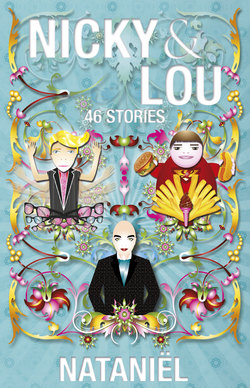Читать книгу Nicky & Lou - Nataniël - Страница 6
На сайте Литреса книга снята с продажи.
Screw
ОглавлениеOn a Tuesday not too long ago, three people arrived at the office of Doctor Friedland, popular psychologist, specialist in genetics and author of the book A Name Is Not Enough.
Heather Heather was a primary school teacher who had seven ginger cats and no children and was part of a loveless marriage.
Marcus Marcus had dreamt of being a successful athlete but was injured at twenty and was now working for his uncle who imported clothes from the East.
Paulson Paulson was a brilliant neurologist who, at 35, was still a virgin because of his shyness, religious confusion and fear of rejection.
One after the other they told Doctor Friedland of their shame, anxiety and low self-esteem. He told each of them to go home, write down the happiest and proudest moments of their lives or those of their families and return one week later.
This is the story Heather Heather wrote: In 1947 my grandfather was twenty years old and lived with his parents in Pietermaritzburg. His mother, my great-grandmother, was a solid woman with arms like trees and a chest like a verandah. His father was a tiny little man who worked at the town hall and rolled thirty cigarettes a day.
The previous year my grandfather had worked as a delivery boy at Bonita’s, a huge department store, but then he stole a gramophone record from the postmaster’s wife and got fired.
Grandfather said he didn’t want the record, but if you hadn’t done anything wrong by the time you turn twenty, you spent the rest of your life trying to find something. He said Great-Grandmother hit him so hard, he was walking to the left for weeks.
Grandfather was still unemployed when the British Royal Family visited the town. He said everybody was working day and night, they were cleaning and painting, planting trees and flowers and renovating furniture. People were borrowing money and having new clothes made for watching the parade. There would be a band in front, then some soldiers, then the car with the king and queen and at the back Princess Elizabeth and Princess Margaret.
Grandfather said he did not have new clothes to stand next to the road with, so he sat in a tree. He said the princesses were not really attractive, so he just looked at the cars. He said when they got to the town hall there was a gun salute and then his father was supposed to ring the bell, but because he had lost so much weight from the stress, he went up with the rope but didn’t come down again, so the bell only rang once. He said Great-Grandmother was boxing her way through the crowd to get to the bell tower and just as he decided to get down from the tree to go and help, he noticed the wheel of the car.
He said those were beautiful cars that came on the royal boat and the wheels had shiny spokes, but one of the screws on a back wheel of the princesses’ car was coming loose. Grandfather ran to the car, kneeled down and tightened the screw. At first nobody noticed him, but then Margaret leaned over and asked him if he had a cigarette.
He told her he would get one from the bell tower, she just had to tell the others to wait, but then the guards grabbed him and people started screaming. He said they dragged him away from the car, he was trying to explain what happened, but nobody would listen. He said he screamed at Margaret to tell them about the wheel, but she just turned around and pretended to like Elizabeth.
Grandfather said he did not go home for a week. He said he had heard Great-Grandmother hit Great-Grandfather so hard he climbed back up the rope and stayed there for days. Grandfather said but when he finally went home, she did nothing.
He then told her what he did, that he saved our country from shame and the British Empire from falling, literally. Why was everybody angry at him?
Because you’re a thief, she said, That’s what you showed them first. It’s the same with animals. They see you’re a bird, they treat you like one. You cannot be something one day and something else the next.
It took my grandfather a long time to find work again, but he did, and he lived in that town, quietly and humbly. Everybody knew what he did for us and for the world, but they said nothing.
The acknowledgement came only much later. People did not know his name, but they spoke about him in ways that became part of our history and our culture. They still do.
They say, Die skroef is los.
Or, Ek gaan jou opskroef.
(from the Coronåtion stage production, 2009)
